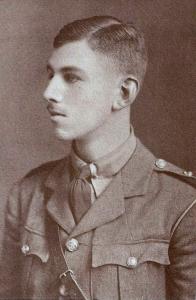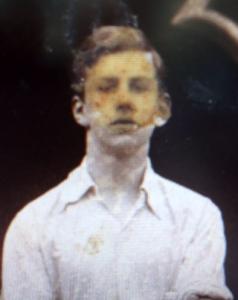
|

|
| 2nd Lieutenant Montagu Frank PEYTON | |
|
16th (Service) Battalion Northumberland Fusiliers (Newcastle) Date of birth: 2nd March 1898 Date of death: 11th July 1917 Killed in action aged 19 Buried at Ramscappelle Road Military Cemetery Plot V Row B Grave 10 |

|
| Montagu Frank Peyton was born at 18 Leighton Street, Plymouth in Devon on the 2nd of March 1898 the younger son of Captain Frank Henry Peyton RN and Janet Wynyard (nee Barker) Peyton of “The Paddock”, Crawley in Sussex. He was educated at Oakfield Preparatory School, Rugby for five years and at Lancing College where he won a Scholarship and was in Heads House from September 1911 to March 1916 becoming a House Captain in 1916. He was a Sergeant in the Officer Training Corps and, played for both the 1st and 2nd XI Football teams. He was very fond of music and especially of choral singing in the chapel. While still at school he applied for a place at the Royal Military College Sandhurst on the 23rd of February 1916 in an application which was supported by the Reverend Bowlby, Headmaster of Lancing College. At a medical examination, which took place in London on the 1st of April 1916, it was recorded that he was five feet nine inches tall and that he weighed 147lbs. He was accepted to Sandhurst where he was in F Company and was promoted to Cadet Sergeant, after which he was commissioned as a 2nd Lieutenant in the Northumberland Fusiliers on the 26th of October 1916. After further training at East Bolden he landed in France on the 16th of December 1916 where he joined the 16th battalion of his regiment while they were in reserve at Bonneville. At dusk on the evening of the 27th of February 1917 the battalion were marching along the Warvillers - Rouvroy Road to relieve the 16th Battalion Lancashire Fusiliers in nearby trenches. While on the road they came under enemy shell fire which wounded 2nd Lieutenant Armitage, Company Sergeant Major Hebson and slightly wounded Montagu Peyton, although he stayed on duty. His father received the following telegram dated the 3rd of March 1917: - "Beg to inform you Second Lieutenant M.F. Peyton 16th Northumberland Fusiliers was wounded slightly February twenty seventh but remained on duty." On the 5th of July 1917 the 16th Battalion Northumberland Fusiliers entered trenches in the Nieuport sector of the line. At around 6am on the morning of the 10th of July the men were in reserve in Nieuport itself when a heavy bombardment of German naval guns began. This was a prelude to a German attack on the units in the front line outside the town. The Fusiliers waited in the cellars throughout the day with orders to move forward not arriving until 10 o'clock that night. When the men moved out of the cellars and into the night the air was thick with gas and masonry was falling around them due to the ongoing bombardment. Three companies quickly moved into trenches to the west of the town on a 1,600 yard front along the Yser Canal. All the bridges across the canal were down and it wasn't until 2am on the morning of the 11th that they received orders and moved across a single narrow bridge to attempt to make contact with the 11th Battalion Border Regiment who were on the other side of the canal and in need of relief. The battalion crossed the canal and the relief was complete by 6am after which patrols were pushed forward to ascertain locate the position of the enemy units which had taken the Border's first and second line. At this time Montagu Peyton was shot and killed by a sniper. At 2pm A Company was detailed to attack a portion of trench which had been lost but were met with overwhelming fire when they showed themselves and were forced to retire with many casualties. A German counterattack was beaten off at 10.45pm and an attack by C Company at 1.45am on the 12th was also a failure. The battalion was relieved by the 5th/6th Battalion Royal Scots shortly afterwards and they withdrew back to Nieuport. Casualties during this period were eleven officers and two hundred and forty other ranks killed, wounded and missing. His father received the following telegram dated the 16th of July 1917: - "Deeply regret to inform you 2nd Lieut. M.F. Peyton 16th Northumberland Fusiliers was killed in action July eleventh. The Army Council express their sympathy." His Commanding Officer wrote:- “I can’t tell you how sorry I am; he was one of my best officers” His Company Commander wrote:- “Your son was in my company, and was, I think my most trusted officer; he was always so keen and took such a great interest in his work and could always be relied upon to perform any work given to him. He was greatly liked by the men of his platoon and company and was one of the most popular officers in this Battalion. In the line he proved himself a very gallant officer.” Another officer wrote:- “I took the company into action on the night of the 10th, during which time one of my officers was killed and the other gassed; your son was the only other left with me to carry on. He did wonderful work in helping to reorganize. We were together on the morning of the 11th just after we had regained the second line. He went to reconnoiter the second line and had not been gone many minutes before I received a message saying he was hit. He was a tremendous loss to us all and to me a loss I shall always regret." His servant wrote:- “He was real gentleman and a very keen soldier. He died a hero’s death, a finer officer it would be hard to find. He is sadly missed by his platoon. In losing him I have lost a good friend whom I had learnt to love.” His brother, Lieutenant John Algernon Wynyard Peyton 7th Battalion Norfolk Regiment, was killed in action on the 22nd of August 1918. He and his brother are commemorated on the Broadstairs war memorial at Holy Trinity Church. He is commemorated on the memorial at the Royal Military College Sandhurst and is listed on the Guernsey Roll of Honour. |
|
 | |
| Heads House |
Back